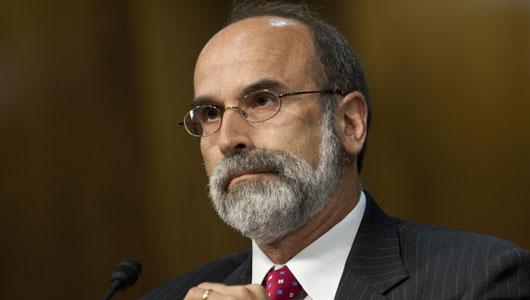A scathing critique of Michael Bromwich, the lawyer overseeing Apple after it lost an iBooks antitrust lawsuit, alleges that he has unfairly billed the company some $2.65 million for investigative practices that have gone well beyond the initial intent of his role.
Calling Bromwich's approach "major abuse even by the standards of modern antitrust," The Wall Street Journal's opinion page this week slammed the antitrust monitor in an editorial. The newspaper suggested that if Apple wins its upcoming appeal of the antitrust ruling, it should sue Bromwich for his investigation.
Bromwich's efforts have cost Apple more than $2.65 million — Â money charged for his services in monitoring the iPad maker. The Journal scoured through his invoices, and found that Bromwich's investigation frequently delved into subjects that had very little or nothing at all to do with the iBooks antitrust suit.
Bromwich's role is supposed to focus on antitrust compliance and training measures, but the Journal's investigation concluded that the attorney "has been stumbling all around Cupertino to conduct a roving, unfettered inquisition into Apple's business."
Specifically, Bromwich reportedly used his position to look into Apple's Siri, Maps, and hardware engineering groups, none of which are related to the e-book antitrust lawsuit.
Apple's closing slide in its e-book antitrust case. | Source: U.S. District CourtAnd while the monitor overseeing the aftermath of an antitrust suit is supposed to be an impartial party, Bromwich also billed Apple for hours he spent with the Department of Justice and state Attorneys General. One of his meetings with the DOJ was related to Apple's efforts to have Bromwich removed.
"In other words, he wasn't acting as a neutral court officer but as an agent of the prosecution — Â and then charging Apple for his trouble," the editorial states. "Mr. Bromwich bills at $1,100 an hour. Apple can be forgiven for seeing him as an adversary and an interloper, because he is."
This week's editorial isn't the first time the Journal has taken Bromwich, the justice system, and Judge Denise Cote to task. In late 2013, the newspaper's opinion page lambasted all parties for being "abusive" and "shredding the separation of constitutional powers." The paper has repeatedly noted close ties between Cote and Bromwich.
Apple and Bromwich have also butted heads, culminating in the aforementioned official request to have him removed. Apple's efforts were shot down by an appellate court, which found that the company failed to provide evidence of irreparable harm. And last April, Bromwich suggested matters had improved, telling the court that relations between himself and Apple were better off.
Apple is still hoping to overturn a verdict that found it and book publishers were guilty of a price fixing conspiracy that raised e-book prices. The Second Circuit Appeals Court will hear Apple's challenge in March, and a victory would allow Apple to avoid paying a $450 million settlement.
Late Apple cofounder Steve Jobs introduces iBooks iPad app and partner publishers in 2010. | Source: AppleThe U.S. government's ruling saddled Apple with an injunction that bars it from entering into any unsavory deals with publishers, and as antitrust monitor, Bromwich's job is to ensure that Apple follows those restrictions. Apple officials have said they continue to fight the case out of principle, because the company insists that no illegal collusion took place between itself and book publishers.
At the time of the iBookstore's launch, Amazon accounted for nine out of every ten e-book sales, and titles were sold under the "wholesale model." In that model, resellers such as Amazon had the power to set prices, selling titles at or below costs if they chose to do so.
Under negotiations led by Eddy Cue, Apple and book publishers opted to switch to a so-called "agency" pricing model. This prevented content owners from being able to sell the same titles at a lower price elsewhere, without offering the same price on Apple's iBooks platform — Â a "most favored nations" clause.
Apple has argued that publishers openly discussed their desire to raise prices on books, as they felt titles were being sold for too little by Amazon under the wholesale model.
 Neil Hughes
Neil Hughes







-m.jpg)






 Christine McKee
Christine McKee
 Malcolm Owen
Malcolm Owen

 Charles Martin
Charles Martin


 Mike Wuerthele
Mike Wuerthele



-m.jpg)






59 Comments
Amazon should be forced to reimburse Apple all legal costs as well. We know they were behind this.
"Mr. Bromwich bills at $1,100 an hour. " Jesus. Money well spent, eh guys? What the **** is this guy contributing to humanity for $1,100/hr?
This whole thing has bothered me from the start. Cote has been known to give the prosecution a win before cases even start. She did that here, declaring, even before she saw any evidence from Apple, that they abused the system, and that they were guilty. If I were Apple attorneys, I would have protested her presence on the case. As far as Bromwitch goes, he's known to be a friend of hers. That's not even proper. This whole thing stinks.
[quote name="Slurpy" url="/t/184825/report-alleges-ibooks-antitrust-monitor-has-committed-major-abuse-against-apple#post_2677444"]"Mr. Bromwich bills at $1,100 an hour. " Jesus. Money well spent, eh guys? What the **** is this guy contributing to humanity for $1,100/hr?[/quote] That's not the worst part. He's not even an expert in this work, so he hired another attorney to assist him who is an expert. He charges about the same amount.
"Mr. Bromwich bills at $1,100 an hour. "
Jesus. Money well spent, eh guys? What the **** is this guy contributing to humanity for $1,100/hr?
Well since he's had to hire another law firm to explain anti-trust law to him he does have higher expenses than usual.... :)